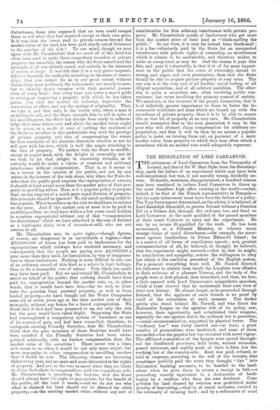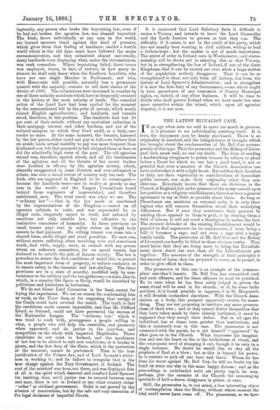THE RESIGNATION OF LORD CARNARVON.
THE retirement of Lord Carnarvon from the Viceroyalty of Ireland, and that of Sir W. Hart Dyke from the Secretary.. ship, mark the failure of an experiment which may have been well-intentioned, but was, if not morally wrong, decidedly un- wise. Ill-health, weariness, disappointment, a hundred reasons may have combined to induce Lord Carnarvon to throw up the most thankless high office existing in the world—unless, indeed, it be that of the French representative in Tonquin- but his main inducement must have been the failure of a policy. The Tory Government determined, on the advice, it is believed, of Lord Randolph Churchill, to govern Ireland without a Coercion Bill or a Crimes Act., through the ordinary law, and fixed on Lord Carnarvon as the most qualified of the passed members of their usual Cabinets to carry out the experiment. He was by no means ill-qualified for the work. He has been accustomed, as a Colonial Minister, to tolerate many strange forms of social disturbance,—for example, the move- ment against landlordism in Prince Edward's Island ; he is a master of all forms of conciliatory speech ; and, greatest recommendation of all, he believed, or thought he believed, that the experiment might succeed,—that is, that he might, by conciliation and sympathy, restore the willingness to obey law which is the condition precedent of the English system. For a moment everything went well. Mr. Parnell directed his followers to abstain from insult, the Loyalists were effusive in their welcome of a pleasant Viceroy, and the body of the people were at first pleased, then interested, and then, we fear, a little amused with Lord Carnarvon's sympathetic speeches, which at least showed that he understood their own view of their own history. He almost forgot, as he proceeded through Ireland, that the applause of one's friends is no proof by itself of the submission of one's enemies. The darker spirits who stand behind Mr. Parnell, and who direct the Nationalist League on the agrarian side of its policy, saw, however, their opportunity, and refurbished their weapons, especially the one against which the ordinary law is powerless, —social excommunication, supported by physical terror. The "ordinary law" was fairly carried out—at least, a great number of prosecutions were instituted, and some of them succeeded—but the popular law was executed with novel vigour. The affiliated committees of the League were spread through- out the disaffected provinces, held trials, warned recusants, passed sentences, and rapidly made of their hidden law the working law of the country-side. Rent was paid, refused, or held in suspense, according to the will of the tenants, who sometimes publicly paid the rents they thought " fair " into Nationalist banking accounts, to be handed to the land- owner when he gave them in -return a receipt in full,—a proceeding exactly equivalent to a declaration of bank- ruptcy by a creditor who fixes his own dividend. Com- petition for land cleared by eviction was prohibited under penalty of boyeotting,—that is, of social outlawry, carried to the extremity of refusing food ; and by a -refinement of cruel
ingenuity, any person who broke the boycotting law, even if he had not broken the agrarian law, was himself boycotted. The Irish, brave individually as any men in the world, are beyond measure timid against this kind of pressure, which gives them that feeling of loneliness amidst a hostile world which in the old days must have followed the major excommunication, and they submitted almost universally, many landlords even displaying what, under the circumstances, was rank cowardice. Where boycotting failed, direct terror was employed, terror, in fact, of torture, in how many in- stances we shall only know when the Southern Loyalists, who have not one single Member in Parliament, and who, with Home-rule still possible, naturally fear a permanent quarrel with the majority, venture to tell their stories of the winter of 1885. The submissions were increased in number by one of those unlucky accidents which have so frequently occurred in the history of the most unlucky of lands. The remedial action of the Land Law had been spoiled for the moment by the unprecedented fall in the price of cereals, which nearly ruined English agriculturists ; and landlords and tenants stood, therefore, in this position. The landlords had lost 20 per cent, of their rentals, without any equivalent reduction in their mortgage interest and other burdens, and out of the reduced margins on which they lived could, as a body, sur- render no more. At the same moment, the tenants, harassed by the low prices, either could not pay in full—we believe that on arable lands actual inability to pay was more frequent than is allowed—or felt that payment in full stripped them as bare as did the admittedly high rents of the past. The old agrarian wound was, therefore, opened afresh, and all the incitements of the agitators and all the threats of the secret leaders were doubled in efficacy by the agrarian misery, which, absurdly exaggerated in some districts and over-estimated in others, was over a broad extent of country only too real. The Irish, who are supposed in England to be so extravagant— because the landlords were—are in reality as greedy as any race in the world ; and the League Committees found behind them regiments of impoverished, and therefore embittered, men. The total result was what we see. The "ordinary law " — that is, the law made or sanctioned by the representatives of the Kingdom — ceased on all agrarian subjects to exist, and was superseded by an illegal code, singularly unjust in itself, and enforced by sanctions not only outside law, but offensive to the instinctive conscience of humanity. In three provinces no small tenant pays rent in safety unless an illegal body assents to that payment. No willing tenant can come into a cleared farm, under illegal and cruel penalties. No man can, without severe suffering, often involving ruin and sometimes death, deal with, supply, serve, or consort with any person whom an unknown committee, for no moral reason, has declared to be outside the pale of human society. The law is powerless to secure the first conditions of social life, to protect the most important form of property, to enforce contracts, or to ensure safety to the innocent and law-abiding. The three provinces are in a state of anarchy, modified only by non- resistance to the soldiery and the tax-gatherers,—a state, that is, which, in a country like Spain or Sicily, would be described by politicians and historians as barbarism.
We do not blame Lord Carnarvon in the least, except for trying the experiment. We see no reason for condemning him as weak, as the Times does, or for supposing that energy at the Castle could have averted the result. The truth is that the conditions made success impossible, and that Mr. Clifford Lloyd, so fettered, could not have prevented the success of the Nationalist League. The "ordinary law," which it was tried to work with, presupposes a people willing to obey, a people who will help the constable, and prosecute when oppressed, and do justice in the jury-box, and sympathise on the whole with impartial Magistrates. Those conditions do not exist in Ireland, and the machinery of law has to be altered to suit new conditions, or it breaks in pieces, and the first duty of the State, which is the protection of the innocent, cannot be performed. That is the true justification of the Crimes Act, and of Lord Spencer's strict- ness in working it ; and its failure to recognise that is the true charge against the Tory Government of Ireland. The root of the mischief was here,not there, and was displayed first of all in the spirit which deserted and insulted Lord Spencer for insisting that, until justice can be secured between man and man, there is not in Ireland or any other country either "order'" or civilised government. Order is not proved by the absence of insurrection, hotly. the safe and easy execution of the legal decisions of impartial Courts. It is rumoured that Lord Salisbury finds it difficult to secure a Viceroy, and intends to leave the Lord Chancellor and the Lords Justices to govern as best they can. The difficulty, if it exists, is not to the credit of his party, which has not usually been wanting in civil soldiers, willing to lead a forlorn-hope ; but the matter is not of much importance. The secret of order in Ireland rests in Westminster ; and states- manship will be shown not in selecting this or that Viceroy, but in so strengthening the law of Ireland, if not of the three Kingdoms, that it can be carried out even when a large section of the population actively disapprove. That it can be so strengthened is clear, not only from all history, but from the history of Lord Spencer's Administration ; and to strengthen it is now the first duty of any Government,—one which ought to have precedence of any concession of County Municipal rights, or, indeed, of any other business. It will be time to decide who shall govern Ireland when we have made law once more operative within the island, which, upon all agrarian disputes, it is not now.



































 Previous page
Previous page